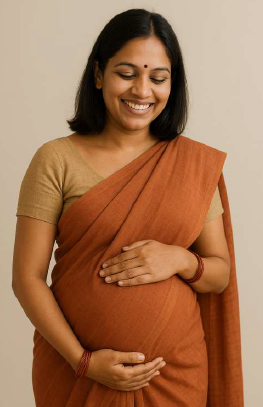Pregnancy full of love

A couple consulted me for the possibility of teratogenic effects of antiepileptic medications on the growing fetus if any. The lady herself was a software engineer, diagnosed with seizures, at the age of 12 years and was on medical treatment since then. She was experiencing seizure activity almost on a daily basis. On her face, some hypo and hyper pigmented spots were there, which could have otherwise been passed as normal acne. The presence of seizures with skin markers got me to think about a genetic condition - Tuberous sclerosis complex [TSC].
On taking further family history, it became apparent that her mother and her two siblings [one brother and sister] were having similar skin marks. However none of them were having any seizure-like activity. I explained to them the possibility of TSC, and the couple agreed for genetic testing in the lady. Genetic test results revealed the presence of a deleterious variant in TSC2 gene, which confirmed my clinical suspicion.
This is an autosomal dominant condition associated with varying degrees of neurodevelopmental abnormalities, seizures and characteristic skin markings. There is a 50% chance of transmitting faulty gene copy to the current and all future pregnancies of hers. During the post-test genetic consultation session, I explained that, though in their family, none of them is having any serious concerns due to TSC, there is a possibility that even with the same genetic variant, the child may have serious outcomes in terms of neurodevelopmental phenotypes.
I discussed the option of invasive prenatal testing in the pregnancy and checking the TSC2 gene variant in the fetal sample. They understood that if the fetus was detected to harbor a faulty copy of the TSC2 gene, it can not be cured. The baby can be followed up after birth for any possible neurodevelopmental abnormalities and “managed” accordingly. They however have the option of discontinuing the present pregnancy if they wish so. They said they will think over it and come back with queries.
After a couple of days, the lady again came with her mother, who was having similar skin markings. After a brief discussion, the lady conveyed emotionally yet firmly, “We are thankful to you for providing us detailed information. However, I do not want to discontinue a pregnancy only because he/she is like me, my mother and my other siblings. My mother has given birth to all of us and I am going to give birth to my child and am ready to take any risk involved in this.” I was deeply touched by her love and commitment for her pregnancy.
This family highlights a very important take on nondirective genetic counseling, especially where reproductive/ irreversible decisions are concerned, providing scientific facts in empathetic manner and still respecting family’s opinions and values.




